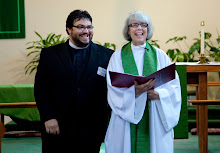There is little doubt that the issue of weekly communion services has emerged – yet again – as a topic for parish discussions. So perhaps we too should devote some time to this issue.
If we look at our Roman Catholic and Orthodox brothers and sisters as well as those who are members of the Anglican Communion, we see that weekly Eucharist is most definitely part of their worship pattern. In fact, most would likely respond that they could not even have Sunday worship without it. So why is it that we as Lutherans can have such a hard time with taking the leap forward and committing to having weekly Eucharist?
While I am always the first to state the importance for us to understand that we are not a cult of Luther, perhaps looking at the reformer's own writing might shed some light on the importance of "the Sacrament of the Altar." In the Small Catechism, Luther asks "What is the benefit of such eating and drinking" referring to communion. The answer provided is "the words 'given for you' and 'shed for you for the forgiveness of sin' show us that forgiveness of sin, life, and salvation are given to us in the sacrament through these words, because where there is forgiveness of sin, there is also life and salvation." We must ask naturally, what does this mean?
It seems that forgiveness of sins is the central point here – that is chiefly grace. It is by this notion, thoroughly Lutheran, which I would make a bold point. We must, in essence, ask ourselves, "how often are we in need of God's grace?" Sometimes? All the time? Only on the first and third Sundays of the month? Surly the answer for us is indeed at all times and in all places for we are sinners in desperate need of God's grace. However we do not have the capacity to receive Eucharist at all times. Additionally, the practice of daily Eucharist, while commendable, is not practical for most. However, that which is certainly practical is weekly Eucharist.
I would readily suggest Eucharist to sinners in need of God's grace. And so I would ask every sinner to ask for communion only as often as you set foot in the door of the parish. And since it is our time together on Sunday that which chiefly defines us socially, if not spiritually, Christians, let us look forward to the day when we too will say that Sunday worship is not worship if it lack communion.

No comments:
Post a Comment